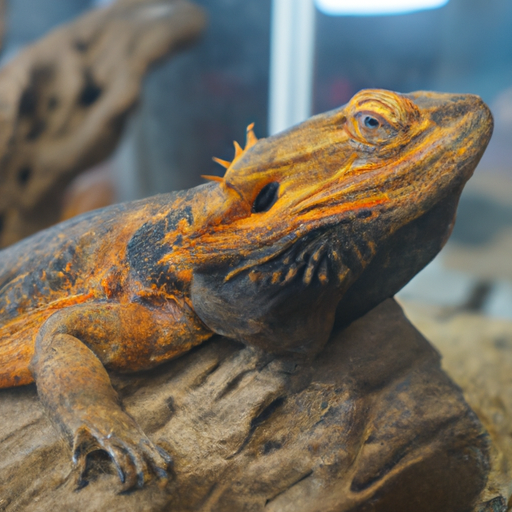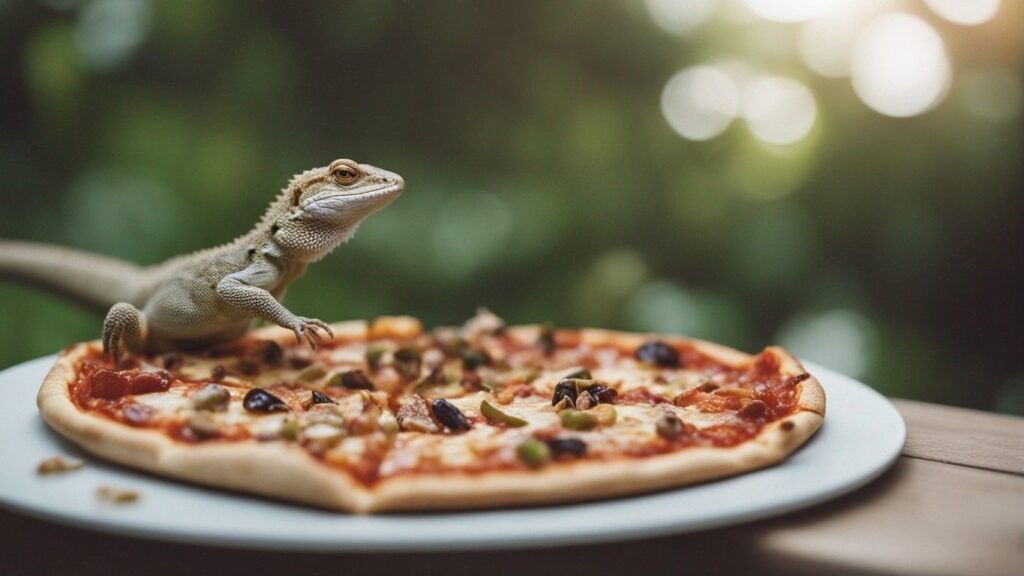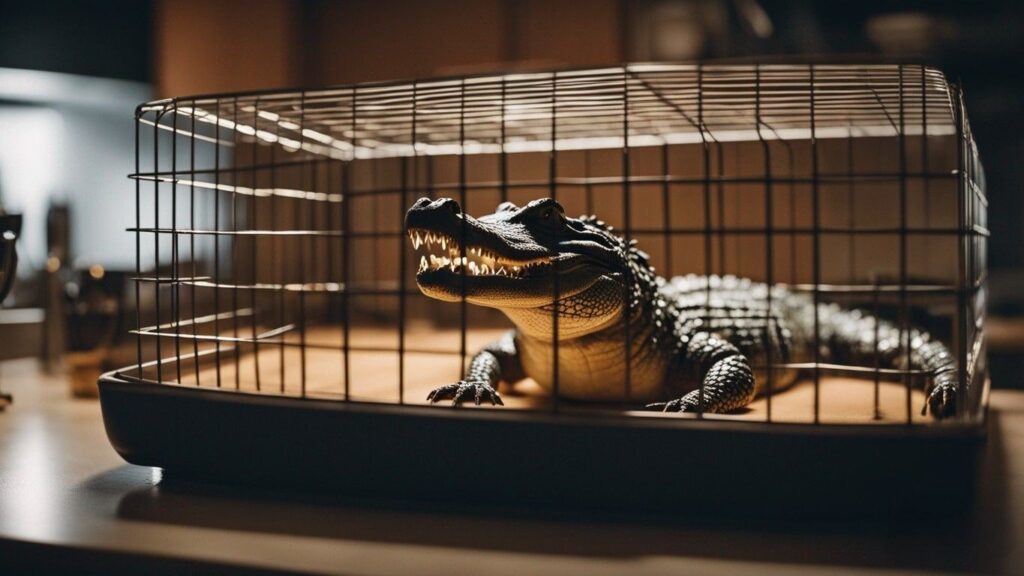So, you’ve been considering getting a pet, and the idea of having a dragon lizard has sparked your interest.
But here’s the thing – before you take the plunge and bring one of these scaly creatures into your home, you might be wondering if dragon lizards are actually good pets.
Well, in this article, we’re going to take a closer look at the pros and cons of owning a dragon lizard, giving you the facts and insights you need to make an informed decision.
Get ready to discover whether these mythical reptiles make for great companions or if you might want to consider other options.

Physical Characteristics of Dragon Lizards
Dragon lizards, also known as bearded dragons, are fascinating creatures with unique physical characteristics. Let’s explore some of their key features!
Size
One of the first things you’ll notice about dragon lizards is their impressive size. These reptiles can grow up to 2 feet in length, with males typically being larger than females.
As hatchlings, they are just a few inches long and gradually reach their adult size over the course of a few years.
Their substantial size makes them visually striking and a delightful addition to any reptile enthusiast’s collection.
Lifespan
If you’re considering a dragon lizard as a pet, it’s important to understand their lifespan. On average, these charming creatures live for around 10 to 15 years when properly cared for.
However, with the right conditions and attentive care, it’s not uncommon for some dragon lizards to live beyond 20 years.
Their longevity ensures that you’ll have a loyal companion for many years to come.
Appearance
One of the most captivating aspects of dragon lizards is their appearance. They have a unique scaly skin, which is usually light tan or yellow in color.
The scales on their throat and chin resemble a beard, hence their common name “bearded dragons.”
These lizards also have a row of spiky scales down their sides, making them look even more majestic. Their eyes, usually a dark color, add to their fierce yet friendly appearance.
Their distinctive physical traits make them a favorite among reptile enthusiasts.
Behavior and Temperament of Dragon Lizards
Understanding the behavior and temperament of dragon lizards is crucial to providing them with the best care possible.
Here’s what you need to know about their social nature, handling, and vocalizations.
Social Nature
Dragon lizards are generally known for their friendly and docile temperament. They are social creatures that enjoy human interaction and can form strong bonds with their owners.
It’s not uncommon to see a dragon lizard perched on your shoulder or happily basking in your presence.
While they might initially be shy or skittish, with time and proper handling, they can become quite comfortable with their human companions.
Handling
When it comes to handling dragon lizards, it’s important to proceed with caution. These reptiles have delicate limbs and should be handled gently to avoid any injuries.
Start by allowing them to become accustomed to your presence before attempting to hold them.
Supporting their body with both hands is crucial to ensure their comfort and safety. Regular handling from a young age can help them become more comfortable with human interaction and reduce their stress levels.
Vocalizations
Dragon lizards are not particularly vocal creatures. While they can produce some sounds, such as hissing or puffing up their beard, these are usually signs of distress or aggression.
It’s important to pay attention to their body language and understand their non-verbal cues to ensure their well-being.
Overall, their calm and quiet nature makes them perfect for those seeking a tranquil and peaceful pet.
Feeding and Dietary Needs of Dragon Lizards
Proper nutrition is essential for the health and well-being of dragon lizards. Here’s what you need to know about their omnivorous diet, feeding schedule, and food preparation.
Omnivorous Diet
Dragon lizards are omnivores, meaning they eat a combination of both plant-based and animal-based foods. Their diet primarily consists of leafy greens, vegetables, fruits, and a moderate amount of insects. Leafy greens such as kale, collard greens, and dandelion greens should make up a significant portion of their diet. Insects like crickets, mealworms, and small roaches also provide vital protein. A balanced and varied diet ensures that your dragon lizard receives all the necessary nutrients for optimal health.
Feeding Schedule
Establishing a regular feeding schedule is crucial for dragon lizards. They should be fed small meals multiple times a day when they are young, gradually transitioning to a once-a-day feeding routine as they grow older. It’s important to monitor their food intake and adjust the quantity based on their age, size, and activity level. Regular monitoring ensures that they maintain a healthy weight and thrive in their environment.
Food Preparation
Preparing their diet is relatively straightforward. Ensure that any insects offered as part of their diet are gut-loaded, meaning they were fed nutritious foods before being offered to your dragon lizard. This ensures they deliver optimal nutrition. Additionally, dusting the insects with a calcium and vitamin supplement provides essential nutrients that may be lacking in their captive diet. As for fruits and vegetables, it’s recommended to feed them raw and sliced into appropriate sizes to aid in digestion.
Housing Requirements for Dragon Lizards
Creating the perfect habitat for your dragon lizard is crucial for their well-being. Let’s explore the housing requirements, including terrarium size, temperature and lighting, and substrate and décor.
Terrarium Size
Dragon lizards require a spacious terrarium to meet their physical and behavioral needs. For a single dragon lizard, a minimum enclosure size of 55 gallons is recommended. However, larger is always better, allowing more room for exploration and exercise. It’s essential to provide vertical space as well, as these lizards enjoy climbing and basking on branches and other elevated surfaces. Ample space ensures a comfortable and stimulating environment for your dragon lizard.
Temperature and Lighting
Maintaining proper temperature and lighting is essential for the overall health and well-being of dragon lizards. The ambient temperature in the terrarium should range between 75-85°F (24-29°C) during the day, with a basking spot that reaches around 95-105°F (35-40°C). A heat lamp or ceramic heat emitter can be used to achieve the desired temperature gradient. Additionally, UVB lighting is crucial for your dragon lizard’s calcium metabolism. Providing a UVB bulb that covers two-thirds of the terrarium will help them receive the necessary UVB rays.
Substrate and Décor
Choosing the right substrate and décor for your dragon lizard’s terrarium is important for their comfort and mental stimulation. Opt for a substrate that allows for easy cleaning and doesn’t pose a risk of ingestion, such as reptile carpet, newspaper, or ceramic tiles. As for décor, provide a mix of natural components like branches, rocks, and vegetation to create different climbing and hiding areas. Incorporating a basking spot, a hiding place, and some foliage will ensure that your dragon lizard feels secure and content in their habitat.

Health Considerations for Dragon Lizards
Ensuring the health and well-being of your dragon lizard is of utmost importance. Let’s explore some common health issues, the importance of veterinary care, and the significance of hygiene and cleanliness.
Common Health Issues
While dragon lizards are generally hardy reptiles, they can still experience various health issues. Some common conditions include respiratory infections, parasites, metabolic bone disease, and shedding problems. Regular health checks and vigilant observation can help detect any potential issues early on. Maintaining appropriate temperature and humidity levels, providing a nutritious diet, and practicing good hygiene can significantly reduce the risk of health problems.
Veterinary Care
Having a reptile-experienced veterinarian is crucial for the well-being of your dragon lizard. Regular check-ups, at least once a year, can help identify any underlying health concerns and ensure that they receive vital vaccinations, such as for parasites. If you notice any changes in appetite, behavior, or physical appearance, it’s important to consult a veterinarian to address the issue promptly. Quick intervention can often prevent minor issues from turning into major health concerns.
Hygiene and Cleanliness
Maintaining a clean habitat is vital in preventing the spread of bacteria and maintaining your dragon lizard’s health. Regularly clean and disinfect their terrarium to remove any waste or potential contaminants. Replace substrate and wash and sanitize all décor items on a regular basis. Providing fresh water daily and avoiding overcrowding in the terrarium also contribute to a healthy and hygienic environment for your dragon lizard.
Training and Taming Dragon Lizards
Building a strong bond with your dragon lizard through proper training and taming techniques can enhance the overall pet ownership experience. Here’s what you need to know about handling, taming, and providing enrichment and stimulation.
Handling Techniques
When handling your dragon lizard, it’s important to employ the right techniques to ensure their safety and comfort. Approach them calmly and confidently, supporting their body with both hands and avoiding any sudden movements. Gradually increase the duration of handling sessions as your dragon lizard becomes more comfortable. Consistency and patience are key to developing trust with your pet.
Taming Process
Taming a dragon lizard involves gradually acclimating them to human interaction and reducing their fear response. Start by spending time near the terrarium, talking softly to your lizard and offering them treats. Once they become comfortable with your presence, you can progress to hand feeding and eventually move on to gentle handling. It’s important to respect your lizard’s boundaries and avoid forcing them into interactions they’re not comfortable with.
Enrichment and Stimulation
Providing mental and physical stimulation is essential for the well-being of dragon lizards. Incorporate various environmental enrichment techniques such as giving them objects to climb on, hiding spots to explore, and puzzles that encourage problem-solving. Additionally, offering a variety of food items and feeding methods can keep them mentally engaged. Regular interactions, such as gentle play sessions or supervised outdoor time, can contribute to their overall happiness and contentment.

Potential Challenges of Owning a Dragon Lizard
While dragon lizards make great pets for the right owners, it’s essential to consider the challenges that come with their care. Let’s explore some of these challenges, including space requirements, cost, and time commitment.
Space Requirements
Dragon lizards require a significant amount of space to thrive. As mentioned earlier, a minimum enclosure size of 55 gallons is recommended for a single lizard, but larger enclosures are even better. This means dedicating a sizable area in your home for their habitat. Additionally, they require regular exercise outside of their enclosure, which means providing a safe and secure space for supervised outdoor time. Ensuring you have ample space to accommodate their needs is crucial before bringing a dragon lizard into your home.
Cost
Owning a dragon lizard comes with various financial considerations. The initial setup costs for their terrarium, heating equipment, lighting, and décor can add up. Additionally, they require a regular supply of food, vitamins, and other supplements. Routine veterinary check-ups, vaccinations, and potential medical expenses also need to be factored in. It’s important to assess your budget and ensure that you can provide for their needs both in the short and long term.
Time and Commitment
Properly caring for a dragon lizard requires a significant time commitment. Feeding them a well-balanced diet, maintaining their terrarium, and providing regular interaction and enrichment activities all take time and effort. Additionally, they require consistent and specialized care throughout their lifespan, including monitoring temperature and humidity levels, observing their behavior, and ensuring their overall well-being. Dragon lizards are not a low-maintenance pet, and their owners must be willing to dedicate the necessary time to meet their needs.
Legal Considerations for Keeping Dragon Lizards
Before bringing a dragon lizard into your home, it’s important to be aware of the legal considerations surrounding their ownership. Here’s what you need to know about local regulations, licensing and permits, and ethical considerations.
Local Regulations
Laws regarding dragon lizards as pets can vary depending on your location. Some regions have restrictions or regulations in place regarding the ownership of certain reptiles. It’s crucial to research and understand the laws in your area to ensure that you comply with all legal requirements. Ignoring these regulations can result in legal consequences and potential harm to your pet.
Licensing and Permits
Certain locations may require licensing or permits for the ownership of dragon lizards. These permits are often in place to ensure that the owner is knowledgeable about the care requirements of these reptiles and can provide a suitable environment for them. Familiarize yourself with any licensing or permit requirements in your area and ensure that you meet all necessary criteria before bringing a dragon lizard home.
Ethical Considerations
Ethical considerations also come into play when deciding to own a dragon lizard. It’s important to assess whether you have the knowledge, time, and resources to provide proper care for these creatures. It’s always preferable to adopt or purchase from reputable breeders who prioritize the well-being of the animals. Remember that owning a pet is a long-term commitment, and you should be prepared to provide for their needs throughout their entire life.

Pros and Cons of Having a Dragon Lizard as a Pet
Now that we’ve explored various aspects of owning a dragon lizard, let’s delve into the pros and cons.
Advantages
Dragon lizards offer a range of advantages as pets. They have captivating physical characteristics, including their unique appearance and impressive size. Their docile nature makes them enjoyable companions, and their social disposition allows for strong bonds and interaction. Their omnivorous diet and relatively simple feeding requirements make them a manageable pet for many. The longevity of dragon lizards ensures a long-lasting connection and years of fulfillment as a pet owner.
Disadvantages
On the flip side, there are a few potential disadvantages to consider. The space requirements for housing a dragon lizard can be challenging, especially for those with limited living space. The initial and ongoing costs associated with their care, including equipment, food, and veterinary expenses, can strain some budgets. Additionally, the time and commitment necessary to meet their specific needs may be demanding for individuals with busy lifestyles. It’s important to weigh these challenges against the rewards before making the decision to bring a dragon lizard into your home.
Personal Preference
Ultimately, the decision to own a dragon lizard comes down to personal preference. Some individuals are drawn to the unique appearance and engaging behavior of these reptiles, while others may prefer a pet with different characteristics. Taking the time to research, understand, and assess your own preferences and capabilities as a pet owner is key to making an informed decision.
Final Thoughts
Dragon lizards make for fascinating and rewarding pets for those willing to dedicate the time, effort, and resources to their care.
Their physical characteristics, social nature, and manageable dietary needs make them a popular choice among reptile enthusiasts.
However, it’s important to consider the challenges, such as space requirements, costs, and time commitment, before bringing one into your home.
By understanding their needs, addressing the necessary health considerations, and providing appropriate training and enrichment, you can create a fulfilling and harmonious bond with your dragon lizard.
Always remember to research and comply with local regulations and ethical considerations to ensure responsible pet ownership.
With the right preparation and commitment, owning a dragon lizard can be a truly rewarding experience.




